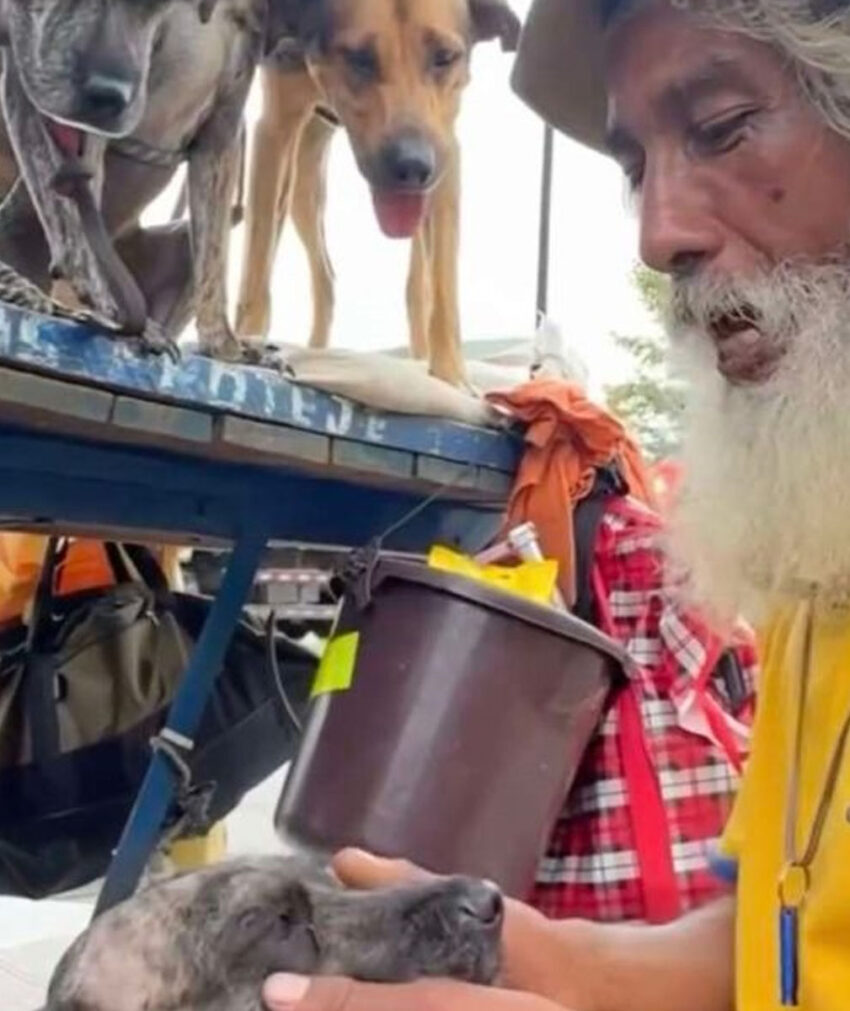I’d passed him maybe three times before I actually noticed him.
You know how it is—eyes down, headphones in, pretending you’re late for something so you don’t have to acknowledge whatever’s right in front of you. But that day, the heat was brutal, and I stopped for water at the corner store. When I came out, there he was—seated cross-legged on the pavement, surrounded by dogs.
Not just with them—surrounded by them.
One on his lap. Two under the bench beside him. Another few resting on a makeshift cart behind him. All different breeds. All calm. All watching him like he was the only thing keeping the world from spinning off its axis.
He had this weathered kindness about him. That kind of calm you don’t fake.
And then I saw the one in his hands.
Sick. Patchy fur. Shaking.
I froze.
He wasn’t just petting her—he was talking to her. Soft, rhythmic. Almost like singing, but not quite. I couldn’t make out the words. But the dog’s trembling started to slow.
And that’s when the others—all of them—lifted their heads in sync. Not barking. Not begging.
Just… listening.
He looked up at me and smiled, like he’d known I was standing there the whole time.
Then he said, “This one’s been waiting for you.”
I blinked. “What?”
He gently turned the dog’s face toward me.
Around her neck, barely visible beneath the fur, was a tag.
And on it was a name I hadn’t heard since my childhood: Luna.
My throat tightened. The last time I’d seen Luna, she was bounding through the fields behind my grandparents’ house, her golden coat catching the sunlight. She disappeared one summer afternoon when I was ten years old. My family searched everywhere, posted flyers, called shelters—but Luna never came back.
“She’s mine,” I whispered, stepping closer despite myself. The man nodded as if this were obvious, as if anyone could see the connection between us written plainly in the air.
“Take her home,” he said simply, handing her over without hesitation. Her body felt fragile against mine, lighter than I remembered, but her eyes locked onto mine with an intensity that made me want to cry.
“But… why are you doing this?” I asked, bewildered. He shrugged, leaning back slightly, letting the other dogs nuzzle around him affectionately.
“They find their way to me,” he replied cryptically. “But they’re not really mine. They belong where they’re loved most.”
Before I could ask more questions or even thank him properly, he patted Luna’s head once more and gestured vaguely toward the street. His meaning was clear: Go.
So I did. I carried Luna—the weight of memory heavy in my arms—and walked away, leaving behind the strange man and his pack of silent companions.
That night, after cleaning Luna up and feeding her tiny portions of food (she ate cautiously, as though afraid it might vanish), I sat cross-legged on the floor next to her bed. She watched me intently, her tail thumping weakly against the blanket.
It struck me then how surreal it all was. How many years had gone by? Fifteen? Sixteen? And here she was again, alive, breathing, looking at me like no time had passed at all. Was this some kind of miracle? Or just dumb luck?
I didn’t sleep much that night. Every time I closed my eyes, I saw the man’s face—the way his voice had commanded attention not just from the dogs but from me too. What had he meant when he said, “They find their way to me”? Who was he? Why had Luna ended up with him?
The next morning, I decided to go back to the corner store. Maybe I’d find him again. Maybe he’d explain things.
But he wasn’t there.
Instead, I found someone else entirely—a young woman sitting on the same bench, cradling a scruffy terrier mix in her lap. She looked up as I approached, her expression wary until she spotted Luna trotting happily beside me.
“You found her,” she said softly, almost reverently. “I thought she’d never come back.”
I frowned. “Do you know her?”
The woman shook her head. “No, but I’ve seen her. With him.”
